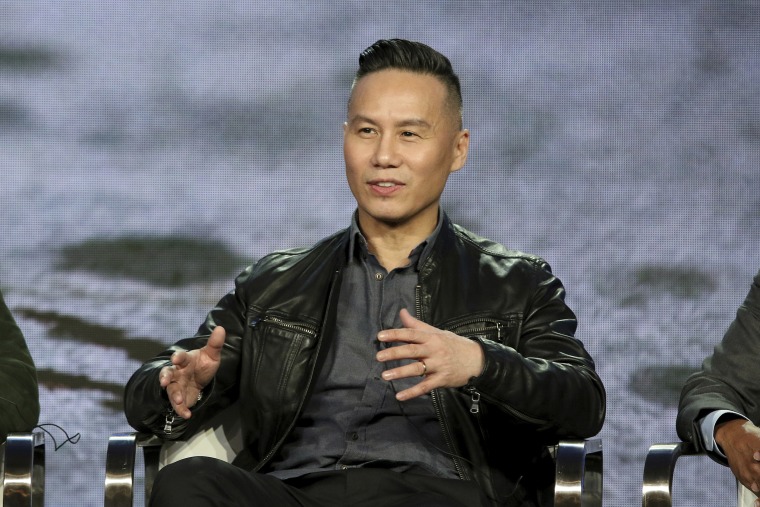He's a critically acclaimed actor, but BD Wong isn't necessarily known for playing the protagonist -- something many Asian Americans who’ve spent significant time in Hollywood can relate to. But he says he's ready for his turn.
The veteran actor has witnessed victories in representation here and there throughout the years. Some moments, like 1993’s “Joy Luck Club,” were particularly monumental, but for some time, a steady flow of progress hadn’t quite been established. The growing voices calling for proper inclusion in recent years, along with the rise of a crop of young Asian American stars including Awkwafina herself, have made Wong optimistic. But cautiously so.
Wong, who is featured in Awkwafina’s new Comedy Central show “Nora From Queens,” told NBC News that he feels a quiet shift in the cosmos for Asian Americans in entertainment.
“I used to complain a lot more about the size of the parts that I was getting. And I still complain about the fact that I'm never really the main character. I played absolutely important characters in television and film, but I've never really been the main character,” Wong said. “And so after a lot of years, you kind of think ‘where's my turn?’ And yet at the same time ... I do feel that if there's a time for that to happen, it's kind of now-ish.”
An introspective Wong doesn’t believe in miracles, however. The fascinating thing about being a human, he explains, is “there's never any way that you can know where you actually are in the landscape of history while it's happening.”
“By the same token, I do feel in this moment right now that it's different. … Nora's energy and Awkwafina’s gold-star brand kind of feel of a new color. It's definitely been a shift in not only the existence of someone like her, but the response to someone like her from the audience and the public in a general kind of perspective, and that's really gratifying.”
Wong sees his role on the show as a symptom of the turning tides. While he’s in a supporting position, the character has depth and weight, with moments in which “the story sometimes turns to me and what my life is about, and that is a sign that we are all well on our way to be tolerant of Asian characters carrying the moment,” he said.
The actor points out that the increase in more multidimensional parts for those in the community isn’t a lucky byproduct of the movement for proper representation. To maintain continued progress for Asian Americans in the industry, Wong says that those who are experiencing star power and momentum have a choice to lift others up with them.
“We always say, ‘I hope in my lifetime, I get to see X, Y, and Z’ and this is kind of one of those things. You hope to see someone who was there for the handoff, that their star was on the rise, that they took the initiative to create opportunities for other Asian Americans and other women in a huge way,” he said of Awkwafina.
“Nora From Queens” boasts a stacked cast, featuring many Asian Americans in front of the camera including Bowen Yang of “Saturday Night Live,” Lori Tan Chinn of “Orange Is the New Black” and Jonathan Park, best known as the rapper Dumbfoundead.
But as Wong points out, the show has also provided opportunities for the underrepresented in the writer’s room as well. Awkwafina announced in February of last year that she’d have an all-women writer’s room, an environment that has traditionally struggled with diversity and inclusion.
A 2019 study of diverse writers revealed that 64 percent reported having experienced bias or discrimination. What’s more, 73 percent of diverse writers have had to repeat a title at least once, rather than be promoted. And 15 percent of the writers took a demotion in order to be on staff.
“You're not waiting for this shift to happen. You're making the shift happen,” he says. “Someone has to give women opportunities. They're absolutely 150 percent viable. They're not like experiment. ... You don't have to wait for them to get an Emmy Award. You do it and now.”
“White men seem to have a kind of benefit of the doubt. And that's what she's doing," he said of Awkwafina. "She's giving these women the same benefit of the doubt of a lot of young bucks.”
There’s no guarantee that mainstream audiences will recognize underrepresented groups like Asian Americans for their acting abilities or skill rather than race, Wong said. But perhaps buy-in or validation from those viewers isn’t the main goal.
“You know, how we say, ‘When will we end war?’ ... That is clearly possibly never going to happen. … In some ways we need to accept that and make the most of the situation we've been given and not eliminate, but lessen the kind of war or the severity of the war or the people being compromised by a war as much as we can,” he explained, returning to the reality of the industry. “Maybe it's just about making room. And the making room is something that I think is actually happening.”
But just as humans are wildly complex, layered beings, so are movements, Wong said. With that, he left the interview, bestowing one major lesson he’s learned.
“Nothing, absolutely nothing in life is binary,” he said. “There’s just always contradictions, there’s always facets, there’s always variation.”
